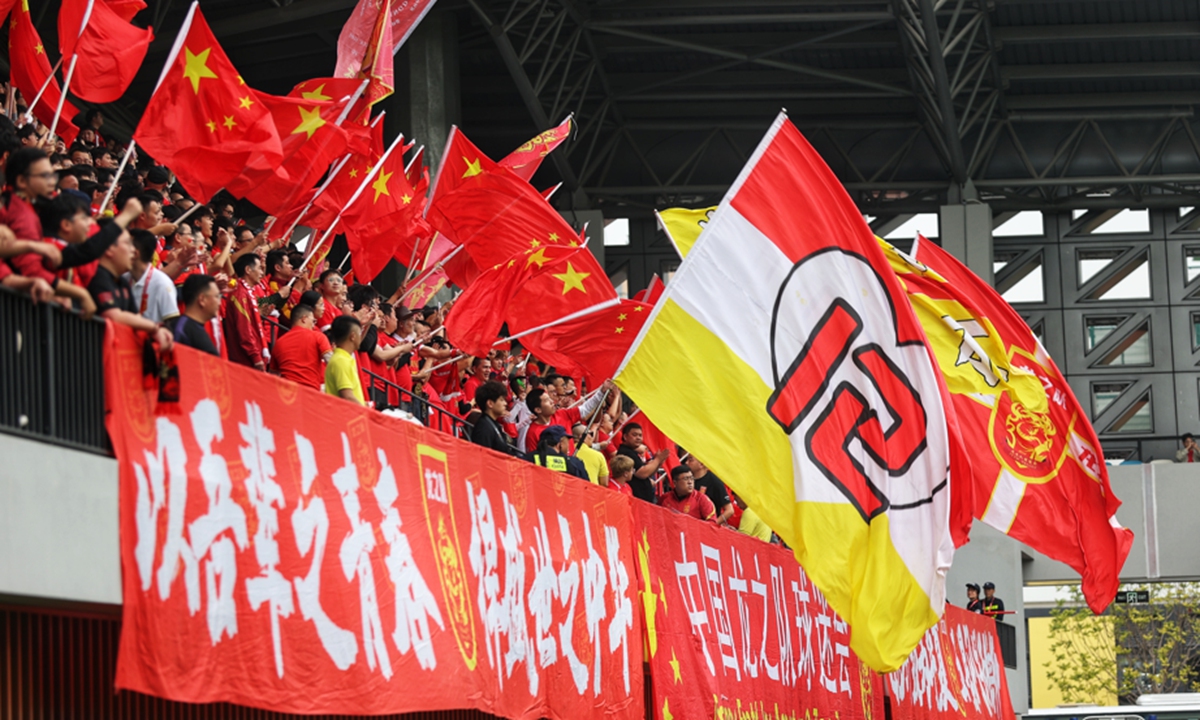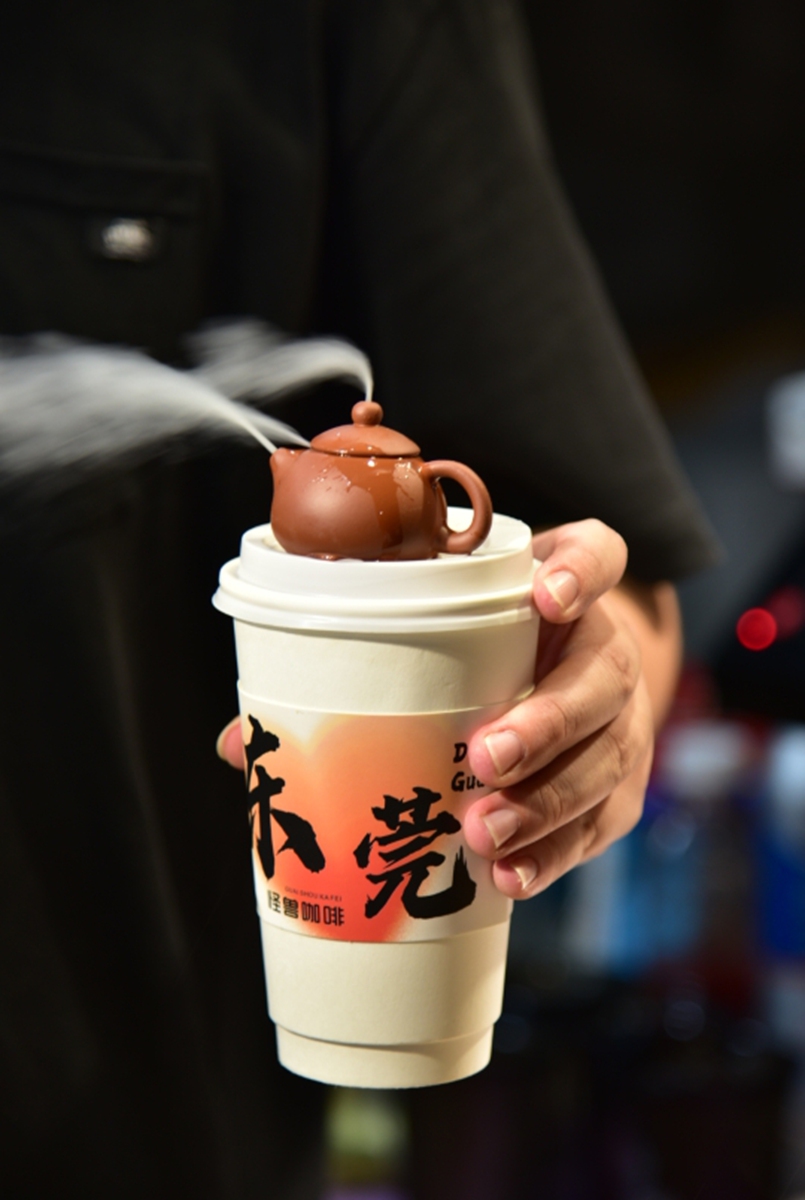
Chinese player Kuai Jiwen (No.10) competes for the ball in the AFC U20 Asian Cup quarterfinal match against Saudi Arabia in Shenzhen, Guangdong Province on February 22, 2025. Photo: Cui Meng/GT
China's national under-20 football team saw their dream of qualifying for the FIFA U-20 World Cup slip away in a cruel fashion, as a stoppage-time goal by Saudi Arabia in the AFC U20 Asian Cup quarterfinals sealed a 1-0 defeat, leaving Chinese football fans in silent disbelief. Chinese fans cheer for the team during the AFC U20 Asian Cup match between China and Saudi Arabia in Shenzhen, Guangdong Province on February 22, 2025. Photo: Cui Meng/GT
But the young squad, spearheaded by Liu Chengyu, Kuai Jiwen and Wang Yudong, has sparked an unexpected optimism - a belief that Chinese football, long mired in stagnation and underachievement, might finally be on the cusp of renewal.
Though their Asian Cup journey ended in heartbreak, their performance revealed an ongoing blueprint of progress, blending tactical innovation and a generation of players unburdened by the ghosts of past failures.
Promising start
As hosts, the Chinese team opened their campaign with a gritty 2-1 victory over Qatar, showcasing tactical discipline and attacking verve rarely associated with Chinese youth teams. The match, played in front of a raucous home crowd in Shenzhen, South China's Guangdong Province saw 19-year-old winger Wang deliver a standout performance, his darting runs and pinpoint crosses unsettling Qatar's defense.
A subsequent 5-2 thrashing of Kyrgyzstan further highlighted the team's growing confidence. Forward Kuai, from Shanghai's Chongming academy, netted a brace, while midfielder Yimulan Maimaiti dictated play with a maturity beyond his years.
Even a 2-1 defeat to Australia in the final group match - a game during which the national under-20 team head coach Dejan Djordjevic rotated his squad to rest key players - could not dampen the momentum as China advanced to the knockout stage.
Central to this progress was Djordjevic's tactical overhaul. Appointed in late 2023, the Serbian coach scrapped the conservative counterattack approach that had long defined Chinese football, opting instead for fluid formations and high-pressing intensity.
During group stages, the team seamlessly shifted between a 4-3-3 attacking setup and a compact 5-4-1 defensive block, adapting to opponents' strengths.
This flexibility, honed through months of rigorous preparation, including six pre-tournament friendlies against stylistically varied opponents like Uzbekistan and Syria, marked a stark departure from China's historically rigid playbook.
"These players are quick learners," Djordjevic said after the Australia match. "They've embraced complexity, and that's how modern football must be played." 
The quarterfinal against Saudi Arabia laid bare both progress and lingering frailties.
China dominated possession for long stretches, with Wang's solo runs repeatedly carving open the Saudi defense.
In the 63rd minute, Kuai came agonizingly close to breaking the deadlock, his acrobatic volley from the edge of the box rattling the crossbar. Ten minutes later, Liu squandered a golden opportunity, as his penalty shot was saved by the Saudi goalkeeper.
As the clock ticked into stoppage time, however, a momentary lapse in concentration proved fatal. Saudi forward Amar Al Yuhaybi capitalized on a defensive miscommunication of the Chinese players, slotting home a rebound to break the hearts of the Chinese fans.
"We controlled the game but failed to finish," Djordjevic lamented post-match to reporters. "But this is football; sometimes you pay dearly for small mistakes."
Systemic reform
Behind the bittersweet campaign at the Asian Cup lies a decade of systemic reform, analysts said.
The 2015 Football Reform and Development Plan, an initiative launched after China's senior team repeatedly faltered in World Cup qualifiers, prioritized youth development through school programs and overseas partnerships.
This U20 squad, composed largely of players born in 2005 and 2006, represents the first cohort to benefit from expanded grassroots participation.
"The partnerships between the Chinese Football Association [CFA] with foreign football associations and league bodies have resulted in waves of certified foreign coaches being sent to China to cultivate domestic talents," Zhang Bin, a Beijing-based sports commentator, told the Global Times.
"They made the advanced training methodologies available to Chinese youngsters at a very early age. These experiences have fostered the technical refinement of youth training."
Unlike previous generations criticized for mechanical play, this under-20 team has displayed nuanced skills such as one-touch passing combinations, diagonal switches and press-resistant dribbling, that drew praises from rivals.
One of the highlights include Australia team captain Daniel Bennie giving a thumbs-up to Chinese forward Kuai as the duo shared a moment of conversation after the group match between the two sides.
Redefine perceptions
The under-20 team's progress has redefined perceptions of domestic football, especially at youth level.
Long accustomed to mocking the national team's shortcomings, Chinese fans flooded social media with messages of pride.
"They play with a courage and creativity we haven't seen in years," wrote one Weibo user after the Saudi defeat, a sentiment echoed by many. "After years of disappointments on Chinese football, this team has finally provided us something to cheer for."
But a defeat is a defeat, as challenges for further progress persist.
While the U20s' run ignited hope, their failure to qualify for the U20 World Cup, a tournament that China last graced in 2005, reveals lingering gaps.
Clinical finishing remains inconsistent, with defensive lapses, particularly during transitions, underscore the need for sharper game management for the players.
Moreover, the senior national team's struggles in World Cup Asian qualifiers - a disjointed 3-1 loss to South Korea in November 2024 highlighted familiar issues - serve as a reminder that youth progress must translate to higher levels.
The road ahead demands sustained commitment.
The CFA, revitalized under new president Song Kai since 2023, has prioritized youth infrastructure. Plans to expand the domestic U21 league and integrate academy youth players into Chinese Super League are already underway.
Current under-20 team players will have another chance to prove their international competitiveness when the qualifications for the 2028 Olympics start in 2026.
Some football experts have called for attention to shift to the U17 Asian Cup in April, where another Chinese squad will attempt to end a 20-year World Cup drought.
With the tournament expanded to eight qualifying slots for Asia, optimism is cautiously rising for the Chinese team.
"A successful U17 World Cup appearance could also create a virtuous cycle, proving that the U20 team's progress is no fluke," Zhu Meng, a Beijing-based sports commentator, told the Global Times.
"The road for progress remains long, the obstacles formidable, but for the first time in two decades, China's football faithful dare to dream," Zhu said.
 China leads expansion of industrial robot installations
China leads expansion of industrial robot installations Blend of traditional tea culture and modern fashion wins hearts of young consumers
Blend of traditional tea culture and modern fashion wins hearts of young consumers 25 hikers trapped in a forest area in Hainan, leaving two injured and one dead
25 hikers trapped in a forest area in Hainan, leaving two injured and one dead Trapped campers during holidays put healthy development of outdoor sports under spotlight
Trapped campers during holidays put healthy development of outdoor sports under spotlight